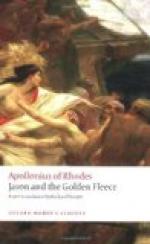all others that dwell in the salt sea because thou
didst refuse to share the couch of Zeus for all his
desire. For to him such deeds are ever dear,
to embrace either goddesses or mortal women. But
in reverence for me and with fear in thy heart thou
didst shrink from his love; and he then swore a mighty
oath that thou shouldst never be called the bride of
an immortal god. Yet he ceased not from spying
thee against thy will, until reverend Themis declared
to him the whole truth, how that it was thy fate to
bear a son mightier than his sire; wherefore he gave
thee up, for all his desire, fearing lest another
should be his match and rule the immortals, and in
order that he might ever hold his own dominion.
But I gave thee the best of the sons of earth to be
thy husband, that thou mightest find a marriage dear
to thy heart and bear children; and I summoned to
the feast the gods, one and all. And with my own
hand I raised the bridal torch, in return for the
kindly honour thou didst pay me. But come, let
me tell a tale that erreth not. When thy son shall
come to the Elysian plain, he whom now in the home
of Cheiron the Centaur water-nymphs are tending, though
he still craves thy mother milk, it is fated that
he be the husband of Medea, Aeetes’ daughter;
do thou aid thy daughter-in-law as a mother-in-law
should, and aid Peleus himself. Why is thy wrath
so steadfast? He was blinded by folly. For
blindness comes even upon the gods. Surely at
my behest I deem that Hephaestus will cease from kindling
the fury of his flame, and that Aeolus, son of Hippotas,
will check his swift rushing winds, all but the steady
west wind, until they reach the havens of the Phaeacians;
do thou devise a return without bane. The rocks
and the tyrannous waves are my fear, they alone, and
them thou canst foil with thy sisters’ aid.
And let them not fall in their helplessness into Charybdis
lest she swallow them at one gulp, or approach the
hideous lair of Scylla, Ausonian Scylla the deadly,
whom night-wandering Hecate, who is called Crataeis,[2]
bare to Phorcys, lest swooping upon them with her horrible
jaws she destroy the chiefest of the heroes. But
guide their ship in the course where there shall be
still a hair’s breadth escape from destruction.”
[Footnote 1: The Symplegades are referred
to, where help was given by Athena, not by Hera.
It is strange that no mention is made of the Planctae,
properly so called, past which they are soon to be
helped. Perhaps some lines have fallen out.]
[Footnote 2: i.e. the Mighty One.]
Thus she spake, and Thetis answered with these words:
“If the fury of the ravening flame and the stormy
winds cease in very deed, surely will I promise boldly
to save the ship, even though the waves bar the way,
if only the west wind blows fresh and clear.
But it is time to fare on a long and measureless path,
in quest of my sisters who will aid me, and to the
spot where the ship’s hawsers are fastened, that
at early dawn the heroes may take thought to win their
home-return.”




